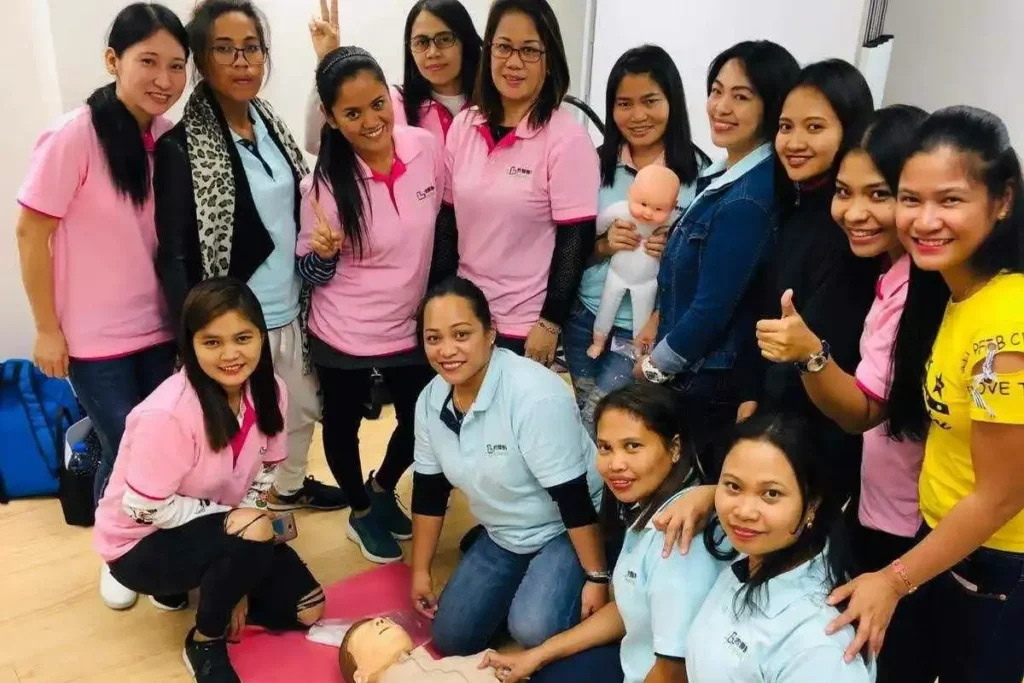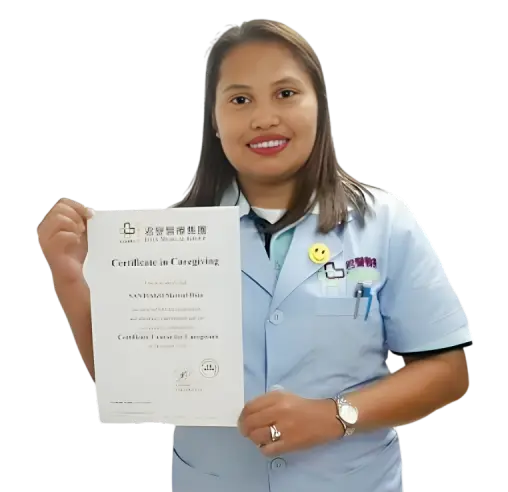What is a Certified Dementia Practitioner? TOP 10 Qualities

- What is a Certified Dementia Practitioner?
- Areas for Specialization for Certified Dementia Practitioners
- Top 10 Qualities of a Certified Dementia Practitioner
- What Does a Certified Dementia Practitioner Do?
- How To Become a Certified Dementia Practitioner
- Certified Dementia Practitioner Certification Programs
- How Much does a Certified Dementia Practitioner Make?
- Resources for Aspiring Certified Dementia Practitioners
- Conclusion
- Frequently Asked Questions (FAQs)
This post may contain affiliate links, meaning I may earn a commission if you make a purchase, at no extra cost to you. I only recommend products I trust. Thank you for your support.
Dementia is a complex and challenging condition that affects millions of individuals and their families worldwide.
It is a progressive brain disorder that impairs cognitive functions such as memory, thinking, and reasoning.
As the condition worsens over time, individuals with dementia often experience difficulties in daily activities and may require specialized care and support.

The impact of dementia extends beyond the affected individual, affecting their loved ones and caregivers as well.
Family members often find themselves overwhelmed and unsure of how to provide the best care and support for their loved ones with dementia.
In this article, we will delve into the significance and how to become a Certified Dementia Practitioner, the qualifications required to attain this certification, and the pivotal role that CDPs play in the care and support of individuals living with dementia.
What is a Certified Dementia Practitioner?
A Certified Dementia Practitioner is a professional who has undergone specialized training and obtained certification in the field of dementia care, and they play a crucial role in providing compassionate and effective care for individuals living with dementia.
The certification process typically involves completing specific coursework related to dementia care, passing an exam, and meeting ongoing education requirements to maintain the certification.
Certified Dementia Practitioners are equipped with the knowledge and skills necessary to provide quality care for individuals living with dementia.
They often work in various settings such as assisted living facilities, memory care facilities, nursing homes, and home care agencies.
Certified Dementia Practitioners are trained to understand the complexities of dementia, develop person-centered care plans, effectively communicate with individuals with dementia, and support their families and caregivers.
Furthermore, Certified Dementia Practitioners are often involved in educating other healthcare professionals, families, and communities about dementia and best practices in dementia care.
Their expertise and training enable them to contribute to the enhancement of dementia care standards and the overall well-being of individuals affected by dementia.
Areas for Specialization for Certified Dementia Practitioners
Certified Dementia Practitioners (CDPs) can specialize in various areas related to dementia care.
Some areas of specialization for CDPs may include:
1. Memory Care Specialists
These Certified Dementia Practitioners specialize in providing care and support specifically tailored to individuals with memory impairments, such as Alzheimer’s disease or other forms of dementia.
2. Behavioral Management Specialists
Certified Dementia Practitioners with a focus on behavioral management are trained to address and manage challenging behaviors often associated with dementia, such as agitation, aggression, or wandering.
3. Family Support Specialists
Some CDPs may specialize in providing support and resources to families and caregivers of individuals with dementia, offering guidance and assistance in managing the challenges associated with caregiving.
4. Training and Education Specialists
CDPs in this specialization may focus on providing training and education to healthcare professionals, caregivers, and staff in dementia care facilities, ensuring they have the necessary knowledge and skills to provide high-quality care to individuals with dementia.
5. Hospice and Comfort Care Specialists
Certified Dementia Practitioners specializing in hospice care and comfort care for individuals with dementia are trained to provide compassionate end-of-life care and support to both patients and their families.
Top 10 Qualities of a Certified Dementia Practitioner
To excel as a Certified Dementia Practitioner (CDP), certain qualities are essential, ensuring both effective care and positive outcomes for individuals and families dealing with dementia.
These qualities collectively contribute to providing holistic, person-centered care that significantly enhances the lives of individuals living with dementia.
Here are the top qualities that distinguish an exceptional CDP:
1. Empathy and Compassion
A paramount quality for any Certified Dementia Practitioner is the ability to empathize and show genuine compassion towards individuals with dementia.
Understanding the emotional challenges faced by individuals with dementia and their families fosters trust and creates a supportive environment.
2. Excellent Communication Skills
Effective communication is key in dementia care. Certified Dementia Practitioners need to articulate information clearly, listen attentively, and adapt their communication style to suit the individual’s needs.
3. Patience and Adaptability
Dementia care often involves unpredictable situations. Patience is crucial when dealing with repetitive behaviors or challenging situations.
Being adaptable allows Certified Dementia Practitioners to adjust their approach based on the unique needs and preferences of each individual.
4. Holistic Approach to Care
Exceptional Certified Dementia Practitioners take a holistic approach to care, recognizing that well-being extends beyond medical aspects.
They address cognitive, emotional, and social needs, tailoring care plans that consider the individual’s overall quality of life.
5. Continuous Learning and Updated Knowledge
The field of dementia care is dynamic, with ongoing research and advancements. A thorough understanding of dementia, its progression, and various caregiving techniques is essential.
Successful Certified Dementia Practitioners stay informed about the latest developments, attend workshops, and engage in continuous learning to provide the best possible care.
6. Cultural Sensitivity
Diverse backgrounds and cultural differences require CDPs to be culturally sensitive. Understanding and respecting cultural nuances contribute to effective communication and the delivery of personalized care that aligns with individual values.
7. Problem-Solving Skills
Dementia care often involves addressing unique and complex challenges. Exceptional CDPs should be adept at identifying issues and finding creative solutions to improve the quality of life for those in their care.
8. Advocacy and Education
An exceptional Certified Dementia Practitioner should be an advocate for individuals with dementia, promoting their rights and ensuring they receive the support and resources necessary for their well-being.
They also play a crucial role in educating families, communities, and other healthcare professionals about dementia, reducing stigma and fostering understanding.
9. Respect for Autonomy
Respecting the autonomy and dignity of individuals with dementia is crucial. A CDP should encourage independence whenever possible and involve the individual in decision-making processes.
10. Attention to Detail
Being attentive to the specific needs and preferences of each individual is important. A Certified Dementia Practitioner should pay attention to detail in order to provide personalized and effective care.
What Does a Certified Dementia Practitioner Do?
The duties and responsibilities of a Certified Dementia Practitioner (CDP) encompass a wide range of tasks aimed at providing comprehensive care and support for individuals living with dementia.
These professionals play a vital role in enhancing the quality of life for those affected by dementia.
The typical duties and responsibilities of a Certified Dementia Practitioner include:
1. Assessment and Care Planning
- Conduct comprehensive assessments of individuals with dementia to understand their specific needs and challenges.
- Develop individualized care plans that address the unique requirements of each person, considering their cognitive, emotional, and physical well being.
2. Direct Care and Support
- Provide hands-on care and assistance to individuals with dementia, including help with activities of daily living, mobility support, and personal care.
- Use person-centered care approaches to engage individuals in meaningful activities and interactions tailored to their interests and abilities.
3. Provide Dementia Educational Support
- Educate families, caregivers, and staff members about dementia, its progression, and effective strategies for providing care and support.
- Offer guidance on communication techniques, behavioral management, and creating dementia friendly environments.
4. Advocacy and Empowerment
- Advocate for the rights and dignity of individuals with dementia, promote their autonomy and decision making within their capabilities.
- Empower individuals with dementia to participate in activities and decisions that affect their lives, fostering a sense of purpose and self worth.
5. Behavioral Management
- Manage challenging behaviors commonly associated with dementia, such as agitation, aggression, or wandering, through non-pharmacological interventions and personalized approaches.
6. Collaboration and Coordination
- Work collaboratively with healthcare professionals, including physicians, nurses, social workers, and therapists, to ensure holistic care for individuals with dementia.
- Coordinate care plans and services, and facilitating multidisciplinary meetings to address the evolving needs of individuals with dementia.
7. Documentation and Record Keeping
- Maintain accurate and detailed records of observations, care interventions, and individual responses to different approaches, ensuring continuity of care and accountability.
How To Become a Certified Dementia Practitioner
Becoming a Certified Dementia Practitioner (CDP) involves several steps, including meeting certain educational and experience requirements, completing specialized training, and obtaining certification.

Here’s a step-by-step process to become a Certified Dementia Practitioner:
Step 1: Meet the Eligibility Requirements
- Have a high school diploma or equivalent.
- Have at least 2 years of experience in a health care setting, social work, or other related fields.
Step 2: Complete the Required Education
- Pursue education in a relevant field such as nursing, social work, psychology, or a related healthcare field.
Step 3: Obtain Specialized Training
- Complete specialized training in dementia care through programs approved by the National Council of Certified Dementia Practitioners (NCCDP) or other recognized organizations.
Step 4: Gain Professional Experience
- Acquire at least one full year of paid professional experience in a healthcare or social work setting, particularly working with individuals with dementia or Alzheimer’s disease.
Step 5: Attend an Approved Seminar
- Completion of an approved Alzheimer’s Disease and Dementia Care seminar, such as the NCCDP seminar, is required.
- The NCCDP provides seminars in Alzheimer’s Disease and Dementia Care throughout the United States and also offers online continuing education opportunities for its members.
Step 6: Apply for Certification
- Apply for certification through the NCCDP or other recognized certifying bodies for dementia care practitioners and pay the relevant fees.
- Fulfill any additional requirements set by the certifying organization, such as passing an exam or providing proof of specialized training and professional experience.
- Your CDP application will be reviewed within 7 business days. If your application is approved, you will receive your CDP certification via email.
Step 7: Maintain Certification
- Once certified, fulfill any continuing education or renewal requirements to maintain the CDP credential.
Certified Dementia Practitioner Certification Programs
These certifications are examples of specialized training programs that can further enhance the expertise of individuals working in the field of dementia care and contribute to their professional development as Certified Dementia Practitioners.
Here are examples of certifications related to dementia care that Certified Dementia Practitioners may pursue:
1. Certified Dementia Practitioner (CDP) Certification Program
Offered by the National Council of Certified Dementia Practitioners (NCCDP), this certification is designed to provide healthcare professionals with comprehensive knowledge and skills in dementia care.
2. Certified Alzheimer’s Disease and Dementia Care Trainer (CADDCT) Certification Program
Also provided by the NCCDP, this certification is tailored for individuals who wish to become trainers in Alzheimer’s disease and dementia care, equipping them to educate and train others in the field.
3. Certified Dementia Care Manager (CDCM) Certification Program
This certification, offered by the National Institute for Dementia Education (NIDE), is designed for professionals in leadership positions responsible for managing dementia care programs and services.
4. Certified Dementia Care Practitioner (CDCP) Certification Program
Provided by the International Council of Certified Dementia Practitioners (ICCDP), this certification aims to enhance the quality of dementia care by ensuring that practitioners possess the necessary knowledge and skills.
How Much does a Certified Dementia Practitioner Make?
The average salary of a Certified Dementia Practitioner in the United States is $47.36 per hour or $98,252.80 per annum as of March 2024.
It’s important to note that individual salaries for CDPs can vary significantly based on job title, department, location, education level, certifications, and other skills.
For example, a Certified Dementia Practitioner in Berkeley, CA earns an average of $64.18 or $133,491 annually.
Executive or management positions typically command higher salaries, and there is considerable variation in salary for each position.
The job outlook for Certified Dementia Practitioners is significant due to the increasing demand for specialized care for individuals with dementia.
As the population ages, the need for professionals with expertise in dementia care continues to grow.
1. Entry-Level CDP Salary
Freshly Certified Dementia Practitioners can expect entry-level salaries ranging from $40,000 to $70,000 annually. This provides a solid foundation and allows for growth as experience accumulates.
2. Mid-Career CDP Salary
With a few years of experience, Certified Dementia Practitioners typically see a notable increase in their earnings. Mid-career salaries range from $70,000 to $100,000 annually.
3. Senior-Level CDP Salary
Seasoned Certified Dementia Practitioners with extensive experience and possibly additional certifications can earn senior-level salaries exceeding $100,000 annually.
Resources for Aspiring Certified Dementia Practitioners
To access resources for becoming a Certified Dementia Practitioner (CDP) and related information, the National Council of Certified Dementia Practitioners (NCCDP) provides an array of valuable resources and services.
Here are some key resources available:
1. Seminars and Training
The NCCDP offers the Alzheimer’s Disease and Dementia Care (ADDC) seminar, classes, webinars, and corporate seminars for individuals seeking specialized training in dementia care.
2. Continuing Education
NCCDP provides continuing education opportunities for its members, including access to NCCDP Online Learning powered by NetCE, which offers outstanding continuing education opportunities.
3. Certification Information
The NCCDP website offers detailed information related to becoming a Certified Dementia Practitioner.
Conclusion
Certified dementia practitioners play a vital role in improving the lives of individuals and families affected by dementia.
Their specialized knowledge, skills, and compassionate care empower individuals with dementia and their families to navigate the challenges of the condition with confidence and resilience.
By providing education, support, and person-centered care, certified dementia practitioners enable individuals with dementia to maintain independence, dignity, and a sense of purpose.
They alleviate the burden on families by offering guidance, resources, and emotional support throughout the dementia journey.
The certification process equips practitioners with the necessary tools to provide high-quality care and stay updated with the latest advancements in dementia care.
Ongoing education and professional development further enhance their expertise and enable them to address the unique needs of individuals with dementia.
Certified dementia practitioners are invaluable in the field of dementia care, improving the lives of countless individuals and families affected by this challenging condition.
Their dedication and commitment make a significant difference in the well-being and quality of life of those impacted by dementia.
Are you searching for a compassionate caregiver with experience in caring for individuals with dementia, contact me here or you can find a live in caregiver in your area.
You may also want to explore these trending articles:
- Beginner intermittent fasting meal plan
- 60 delicious Daniel Fast recipes
- Nurse anesthetist salary in United States
- 7-day meal plan for prediabetes
- Life expectancy with fatty liver disease
- Pancreatitis meal plan
- Thyroid cancer symptoms and care tips
- Therapy dogs for emotional support
- Respite care for caregivers
- Cognitive stimulation therapy activities
- How much do physical therapists make?
Frequently Asked Questions (FAQs)
How much does a certified dementia practitioner make?
As of March 2024, the median salary for a Certified Dementia Practitioner in the United States stands at $47.36 per hour, equating to an annual salary of $98,252.80.
What does a certified dementia practitioner do?
A Certified Dementia Practitioner is responsible for providing specialized care and support to individuals living with dementia.
This includes developing care plans, offering support to individuals and their families, educating other care professionals, and advocating for improved quality of life for those affected by dementia.
How long does it take to become a Certified Dementia Practitioner?
It generally takes 7 business days to process a CDP application. To become a Certified Dementia Practitioner, individuals must also complete a 7-hour Alzheimer’s Disease and Dementia Care Seminar and meet certain experience requirements.
What is the difference between dementia and Alzheimer’s?
Dementia is a broad term encompassing symptoms like memory loss and cognitive issues, while Alzheimer’s disease specifically involves progressive memory and cognitive decline. In essence, Alzheimer’s is a type of dementia, but not all dementia cases are Alzheimer’s.
How to become a Certified Dementia Practitioner?
To become a Certified Dementia Practitioner, individuals usually need to complete a recognized training program offered by organizations like the National Council of Certified Dementia Practitioners (NCCDP). This training covers various aspects of dementia care, and upon successful completion, individuals can apply for certification.




